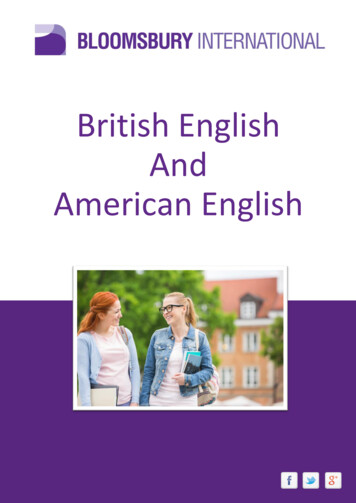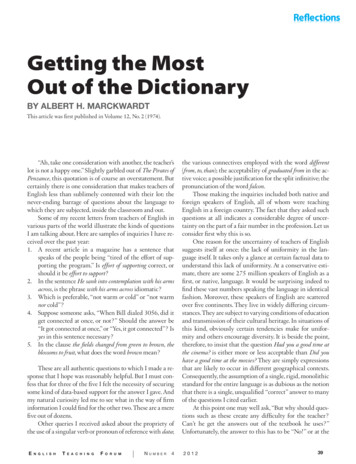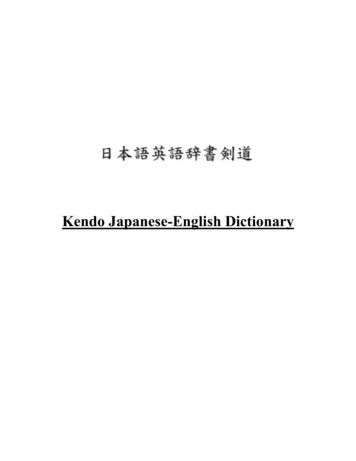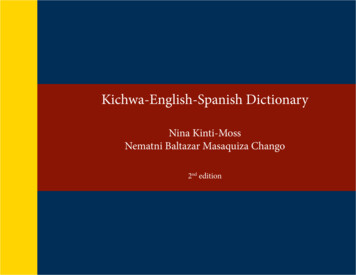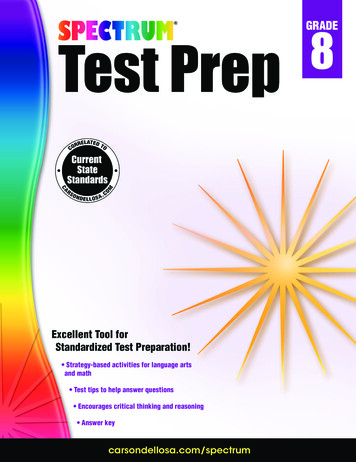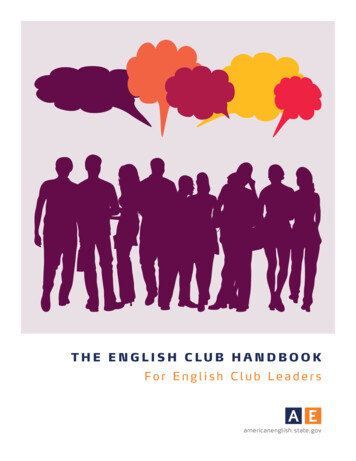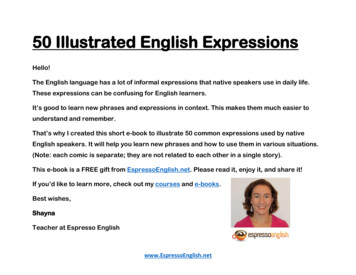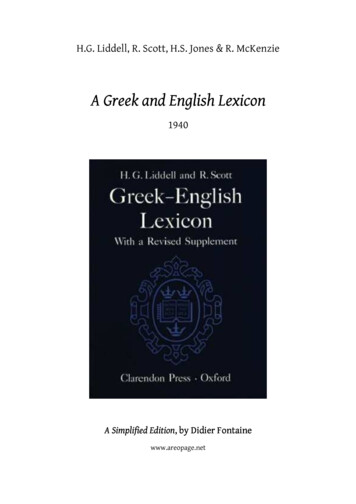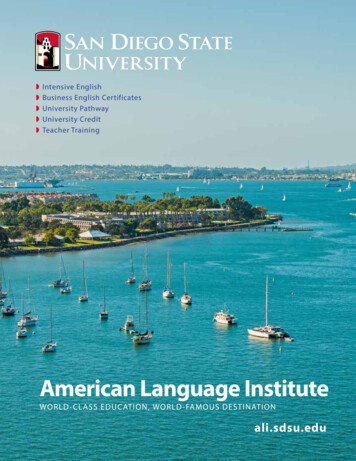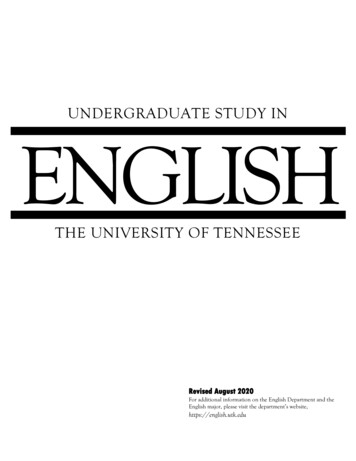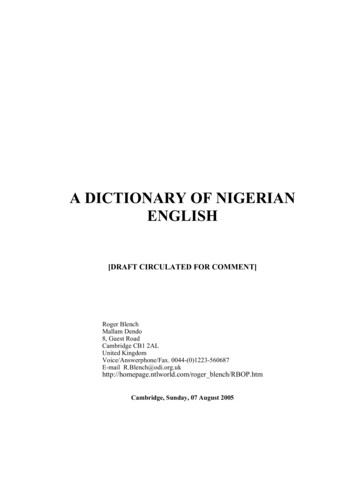
Transcription
A DICTIONARY OF NIGERIANENGLISH[DRAFT CIRCULATED FOR COMMENT]Roger BlenchMallam Dendo8, Guest RoadCambridge CB1 2ALUnited KingdomVoice/Answerphone/Fax. 0044-(0)1223-560687E-mail ger blench/RBOP.htmCambridge, Sunday, 07 August 2005
TABLE OF CONTENTSAbbreviations.iiPreface .iiIntroduction .1Sources.1Spelling .1Nigerian English/West African English.1Pidgin versus Nigerian English .1Auxiliaries .2Student slang.2Pronunciation spellings .2Re-interpretation of pidgin .3Style versus substance .3From NE to SE.4Spelling pronunciation .4Missionary English .4Scientific names, and trade names .4Regional variation .4Phonology .5Parts of Speech.5References .6B. .2C. .5D. .7E. .9F.9G. .10H. .12I. .13J. .14K. .14L. .15M. .16N. .18O. .18P.19Q. .22R. .22S.23T. .25U. .27V. .27W. .27X. .28Y. .28Z. .28Numbers .29i
deo.ins.joc.lit.NENNESESNEsc. sl.st. sl.TEAfrican EnglishAmerican (for terallyNigerian EnglishNorthern Nigerian EnglishStandard EnglishSouthern Nigerian Englishschoolboy slangstudent slangTropical EnglishPrefaceThis dictionary of Nigerian English was stimulated by some enquiries from the Oxford English Dictionaryon words of putative West African origin. The OED faces an increasingly uphill struggle in its attempts tocapture World English; almost every Anglophone country has now developed a set of distinctive uses, somemore divergent than others. It is surprising, however, that Nigerian English has never been the subject of apublished dictionary; rumours abound of mighty manuscripts, but these have yet to see the light of day. Arecent publication by Igboanusi goes some way towards remedying this deficiency but the inclusion here ofmany words not in his dictionary indicates how much work is still to be done.The present manuscript is a draft of a document that will eventually, I hope, become a collective product. Idoubt that one individual could produce anything very comprehensive; Nigeria is too diverse andregionalised. But it seems sensible to lay down an initial marker; then additions can be made. I amcirculating this to individuals I know have an interest; but please send any further information, comments,emendations etc. to the email or address given on the title page.Roger BlenchCambridgeSunday, 07 August 2005ii
Dictionary of Nigerian EnglishIntroductionCirculation DraftRoger BlenchThese notes are intended to raise some issues on sources, interpretation and the definition of NigerianEnglish.Sources1One of the most difficult issues in lexicography is documenting usages in a semi-written language. Ifdictionaries of indigenous African languages are prepared they usually depend entirely on oral sources andthus no specific justification is given for entries. However, Nigerian English is sometimes written, especiallyin newspapers and magazines, and thus has some sort of orthographic tradition. Nonetheless, many of themost picturesque expressions are strictly oral and must still be captured in the present document. Althoughprevious studies in this direction have tended to cite novels or literary works (notably Jowitt 1991) these aresometimes unrepresentative of the spoken language. I have therefore used newspaper, notices and overheardspeech as sources. Example sentences not specifically sourced should be treated as based on the author’s orhis correspondents’ experiences.SpellingNigerian English is printed regularly in the newspapers and since much of it consists of using SE inextended senses spelling is generally not a problem. Some forms of pidgin origin such as ‘done’ haveconventional representations, e.g. ‘don’. However, others, such as ‘rubber’ are pronounced in a variety offorms, such as rçba, rUba etc. depending on sociolinguistic considerations. To capture this, I have writtenphonologised pronunciations in square brackets after head entry. Thus;leather [lεda]Nigerian /Ghanaian/ West African EnglishOne of the more surprising things about Nigerian English is the extent to which it has a common lexicon andgrammar with other West African Englishes, notably Ghanaian. A guide to Ghanaian English (Kirby 1998)provides an interesting comparison with the present document and parallel forms are noted2. I have lessinformation about Cameroun, Sierra Leone and Gambia and would welcome further insights. However, thepuzzle is the history of some of these forms. Do they go back to the early days of colonial presence on thecoast or are they more recent products of the massive migration of Ghanaians to Nigeria during the oil-boomera of the 1970s and 1980s? Probably both, but only a detailed scanning of earlier sources will provideanswers.Pidgin versus Nigerian EnglishNigerian English is regarded as distinct from Pidgin English, although the exact location of the boundarybetween them differs from speaker to speaker. Some expressions are regarded as strictly Pidgin, for examplepickin for 'child' and sabi for 'to know'. I have thought it best to be quite inclusive, but no doubt some of theentries will be questioned.1Thanks to Philip and Vicky Ostien and especially to Kay Williamson for many useful suggestions.Prof. Mary Esther Kropp-Dakubu of Legon University has kindly gone through the draft text and marked all thoseentries which also have parallels in Ghanaian English.21
Dictionary of Nigerian EnglishAuxiliariesCirculation DraftRoger BlenchOften the distinctiveness of Nigerian verbs in use consists of unusual auxiliaries applied to conventionalverbs. Some of these are as follows;donehe done gohe went [Pidgin!]gotthe thing got spoiledthe water got finishedhashe has gohe went [just imperfect learning, not standard]use tohe use to come herehe comes here regularly [back formation from used to]Student slangSchools and universities are good but extremely localised sources of slang; Ibadan University in particularseems to have been an important source of unusual expressions. Indeed a small book was published of theseexpressions when Ibadan was the only university (Opara & Oleghe 1956). Asomugha (1981) began life as acompendium of student slang but was enlarged to take in some more mainstream Nigerian Englishexpressions. Such expressions are often highly localised in time and place; few expressions mentioned inthis book appear to be still in use. Where a term seems to be student slang I have noted it; this is a rich anddistinct field. Kay Williamson (p.c.) has supplied a number of expressions currently (2002) in use in theUniversity of Port Harcourt, but it is difficult to know how widespread these are.Tropical EnglishThere are numerous terms which may be termed ‘Tropical English’; unknown to most speakers of SE, theyare nonetheless not specific to Nigeria, but are nonetheless widely used across the Anglophone tropics. Thisis very common in p
This dictionary of Nigerian English was stimulated by some enquiries from the Oxford English Dictionary on words of putative West African origin. The OED faces an increasingly uphill struggle in its attempts to capture World English; almost every Anglophone country has now developed a set of distinctive uses, some more divergent than others. It .
